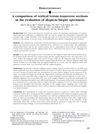Search
forProducts matching "female pattern alopecia"
Tracking 2 products like 151 Tugain 5 Solution (Minoxidil 5%) and 152 Tugain 10 Solution (Minoxidil 10%) from by companies like Inhouse Pharmacy. View all 2 products »
Sort by
Research
300-330 / 1000+ results
research Understanding Causes of Hair Loss in Women
The conclusion is that hair loss in women is caused by a mix of hormonal, environmental, and genetic factors, and treatments should target these various causes.

research Androgens in Women: Hormone-Modulating Therapies for Androgen-Mediated Cutaneous Disorders
Hormone treatments can help with women's skin and hair disorders, but they need careful monitoring and more research.

research Pharmacologic Management of Pattern Hair Loss
Treat pattern hair loss with finasteride and topical minoxidil.

research Hair Through the Female Life Cycle
Women's hair generally gets thinner and less dense starting in their mid-thirties, with hair loss becoming more common as they age due to both genetics and environment.

research Study of Frontal Hairline Patterns in Spanish Caucasian Women
Most Spanish Caucasian women have a widow's peak, and their hormone levels suggest they process certain hormones faster.

research Randomized Non-Inferiority Study of Oral Minoxidil (1.25 mg/day) vs. 5% Topical Minoxidil in Treating Female Pattern Hair Loss
Oral minoxidil is as effective and safe as topical minoxidil for treating female pattern hair loss.

research Pattern Baldness: Its Genetics Revisited
Pattern baldness is likely caused by a dominant gene influenced by testosterone levels, making it more common in men.

research No Association Between Serum Ferritin Levels Greater Than 10 μg/l and Hair Loss Activity in Women
Higher iron levels in the blood are not linked to increased hair loss in women.

research Dietary Supplement Increases Anagen Hair Rate in Women With Telogen Effluvium: Results of a Double-Blind, Placebo-Controlled Trial
The dietary supplement helped increase hair growth in women with hair loss.

research Alopecia Areata Masquerading as Frontal Fibrosing Alopecia
Alopecia areata can look like frontal fibrosing alopecia, making diagnosis hard.

research Contraindicated Use of 5-Alpha-Reductase Inhibitors in Women
The document concludes that women should not use 5-alpha-reductase inhibitors due to the risk of birth defects and limited effectiveness.
research Male Androgenetic Alopecia
Male pattern baldness worsens with age and can be treated with medications like minoxidil and finasteride, but side effects and personalized care are important.

research Promotion of Hair Regrowth in Androgenetic Alopecia with Supplemented Erzhi Wan: Exploring Its Mechanism Using Network Pharmacology and Molecular Docking
Supplemented Erzhi Wan may help regrow hair in male pattern baldness by affecting certain cell signaling pathways.

research Bioinformatic Analysis of Gene Expression Data Reveals Src Family Protein Tyrosine Kinases as Key Players in Androgenetic Alopecia
Protein tyrosine kinases are key in male pattern baldness, affecting skin structure, hair growth, and immune responses.

research Cutaneous Findings and Systemic Associations in Women With Polycystic Ovary Syndrome
Women with PCOS often have more body hair, acne, and skin darkening, and these signs are linked to metabolic issues like insulin resistance and high cholesterol.

research A Split Head Study of Efficacy of Placebo Versus Platelet-Rich Plasma Injections in the Treatment of Androgenic Alopecia
Platelet-rich plasma injections can effectively treat male pattern hair loss, improving hair density and quality with high patient satisfaction.

research A Simplified Approach to the Diagnosis of Alopecia
A simplified method was introduced to diagnose most hair loss types by examining the patient's history and scalp, with some cases needing further tests.

research Alopecia: Children Are Not Just Little People
Hair loss in children is diagnosed and treated differently than in adults, with different common causes and a focus on less invasive methods.

research Better Treatment Outcomes for Patients with Alopecia
Oral minoxidil can improve hair thickness and a comprehensive treatment approach leads to better alopecia outcomes.

research Endocrine Therapy-Induced Alopecia in Patients With Breast Cancer
Hair loss from hormone therapy in breast cancer patients can be improved with minoxidil treatment.

research A Comparison of Vertical Versus Transverse Sections in the Evaluation of Alopecia Biopsy Specimens
Using both vertical and transverse sections gives a better diagnosis of alopecia than using one method alone.

research Management of Hair Loss in Women
Certain medications and maintaining adequate iron levels can help manage women's hair loss.

research The Efficacy and Use of Finasteride in Women: A Systematic Review
Finasteride improves hair growth and reduces hirsutism in women, but side effects and optimal dosages need further research.

research Androgenetic Alopecia: Overview, Diagnosis, and Treatment
AGA is a common hair loss disorder, and early diagnosis and treatment with minoxidil or finasteride can help reduce emotional distress.

research Treatment Guidelines in Adult Women: Effectiveness of Hormonal Therapy in Treating Acne Vulgaris
Hormonal therapy is effective for treating acne in adult women, especially with signs of high androgen levels.

research Hair Loss in Men and Women: Medical and Surgical Treatments for Androgenic Alopecia
The document concludes that ongoing medical therapy is crucial for preventing hair loss, and surgical options can restore hair, with future treatments for hair loss being promising.

research How Do You Treat Premature Hair Loss in Women in Your Practice
The document concludes that hair loss in women is treated with medications, therapies, and surgery in Western medicine, and with acupuncture and herbs in Chinese medicine, but hereditary hair loss is hard to reverse.

research Androgenic Alopecia: Current Evaluation and Treatment Options
Advancements in technology now allow better evaluation and treatment for women with common hair loss problem, androgenic alopecia.

research Chronic Telogen Effluvium: Increased Scalp Hair Shedding in Middle-Aged Women
Middle-aged women with chronic telogen effluvium experience increased hair shedding but usually don't get significantly thinner hair.